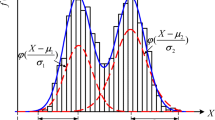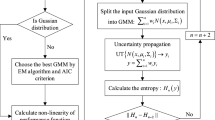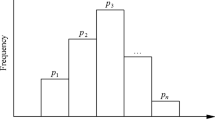Abstract
In practical engineering problems, random variables may follow a multimodal distribution. Traditional uncertainty propagation methods may yield poor effectiveness for multimodal distribution problems. In this paper, an uncertainty propagation method is proposed for multimodal distributions via a unimodal decomposition strategy. First, a Gaussian mixture model is used to build the probability density function of multimodal random variables. Second, a set of unimodal elements is constructed based on the decomposed multimodal random variables. In this way, it avoids computing higher-order statistical moments and the first 4th-order statistical moments can satisfy the accuracy requirements. Third, the probability density function of the response function in each element is computed using an arbitrary polynomial chaos expansion and the maximum entropy method. Finally, the probability density function of the response function in the complete probability space can be obtained by accumulating the probability density functions of the response functions in the elements. Three examples are investigated to validate the effectiveness of the proposed method.
Graphical abstract



















Similar content being viewed by others
References
Ahlfeld R, Belkouchi B, Montomoli F (2016) SAMBA: sparse approximation of moment-based arbitrary polynomial chaos. J Comput Phys 320:1–16
Asquith WH (2007) L-moments and TL-moments of the generalized lambda distribution. Comput Stat Data Anal 51(9):4484–4496
Au S-K, Beck JL (2001) Estimation of small failure probabilities in high dimensions by subset simulation. Probab Eng Mech 16(4):263–277
Bai S, Kang Z (2021) Robust topology optimization for structures under bounded random loads and material uncertainties. Comput Struct 252:106569
Bhattacharyya B (2020) Global sensitivity analysis: a Bayesian learning based polynomial chaos approach. J Comput Phys 415:109539
Bhattacharyya B (2022) Uncertainty quantification and reliability analysis by an adaptive sparse Bayesian inference based PCE model. Eng Comput 38(2):1437–1458
Bhattacharyya B (2023) On the use of sparse Bayesian learning-based polynomial chaos expansion for global reliability sensitivity analysis. J Comput Appl Math 420:114819
Bourinet JM, Deheeger F, Lemaire M (2011) Assessing small failure probabilities by combined subset simulation and support vector machines. Struct Saf 33(6):343–353
Breitung K (1984) Asymptotic approximations for multinormal integrals. J Eng Mech 110(3):357–366
Castillo-Barnes D, Martinez-Murcia FJ, Ramírez J (2020) Expectation-maximization algorithm for finite mixture of α-stable distributions. Neurocomputing 413:210–216
Du X (2007) Saddlepoint approximation for sequential optimization and reliability analysis. J Mechan Design. https://doi.org/10.1115/1.2717225
Fan W, Wei J, Ang AHS (2016) Adaptive estimation of statistical moments of the responses of random systems. Probab Eng Mech 43:50–67
Figueiredo MAT, Jain AK (2002) Unsupervised learning of finite mixture models. IEEE Trans Pattern Anal Mach Intell 24(3):381–396
Grigoriu M, Probabilistic methods in structural engineering. In: G Augusti, A Baratta and F Casciati, Chapman and Hall - Methuen Inc., New York, 1984, pp. 556. Structural Safety. 4(3) (1987) 251–252.
Guo L, Liu Y, Zhou T (2019) Data-driven polynomial chaos expansions: a weighted least-square approximation. J Comput Phys 381:129–145
Hu Z, Du X (2018) Reliability Methods for Bimodal Distribution With First-Order Approximation1. ASCE-ASME J Risk and Uncert in Engrg Sys Part B Mech Engrg. https://doi.org/10.1115/1.4040000
Hu ZL, Mansour R, Olsson M (2021) Second-order reliability methods: a review and comparative study. Struct Multidisc Optim 64(6):3233–3263
Huang ZL, Jiang C, Zhou YS (2016) An incremental shifting vector approach for reliability-based design optimization. Struct Multidisc Optim 53(3):523–543
Jacquelin E, Baldanzini N, Bhattacharyya B (2019) Random dynamical system in time domain: a POD-PC model. Mech Syst Signal Process 133:106251
Li L, Chen G, Fang M (2021) Reliability analysis of structures with multimodal distributions based on direct probability integral method. Reliab Eng Syst Saf 215:107885
Liu Y, Zhao J, Qu Z (2021a) Structural reliability assessment based on subjective uncertainty. Int J Comput Methods 18(10):2150046
Liu Z, Yang M, Cheng J (2021b) A new stochastic isogeometric analysis method based on reduced basis vectors for engineering structures with random field uncertainties. Appl Math Model 89:966–990
Livesey AK, Brochon JC (1987) Analyzing the distribution of decay constants in pulse-fluorimetry using the maximum entropy method. Biophys J 52(5):693–706
Marseguerra M, Zio E, Devooght J (1998) A concept paper on dynamic reliability via Monte Carlo simulation. Math Comput Simul 47(2):371–382
Mori Y, Kato T (2003) Multinormal integrals by importance sampling for series system reliability. Struct Saf 25(4):363–378
Ni YQ, Ye XW, Ko JM (2010) Monitoring-based fatigue reliability assessment of steel bridges: analytical model and application. J Struct Eng 136(12):1563–1573
Nobile F, Tempone R, Webster CG (2008) A sparse grid stochastic collocation method for partial differential equations with random input data. SIAM J Numer Anal 46(5):2309–2345
Nouy A (2010) Identification of multi-modal random variables through mixtures of polynomial chaos expansions. CR Mec 338(12):698–703
Oladyshkin S, Nowak W (2012) Data-driven uncertainty quantification using the arbitrary polynomial chaos expansion. Reliab Eng Syst Saf 106:179–190
Pearson K, IX. Mathematical contributions to the theory of evolution.—XIX. Second supplement to a memoir on skew variation. Philosophical Transactions of the Royal Society of London. Series A, Containing Papers of a Mathematical or Physical Character. 216(538–548) (1916) 429–457.
Qiao X, Wang B, Fang X (2021) Non-probabilistic reliability bounds for series structural systems. Int J Comput Methods 18(09):2150038
Rahman S, Xu H (2004) A univariate dimension-reduction method for multi-dimensional integration in stochastic mechanics. Probab Eng Mech 19(4):393–408
Sachdeva SK, Nair PB, Keane AJ (2006) Hybridization of stochastic reduced basis methods with polynomial chaos expansions. Probab Eng Mech 21(2):182–192
Shao Q, Younes A, Fahs M (2017) Bayesian sparse polynomial chaos expansion for global sensitivity analysis. Comput Methods Appl Mech Eng 318:474–496
Smolyak SA (1963) Quadrature and interpolation formulas for tensor products of certain classes of functions. Soviet Math Dokl 4:240–243
Sobczyk K, Trcebicki J (1999) Approximate probability distributions for stochastic systems: maximum entropy method. Comput Methods Appl Mech Eng 168(1):91–111
Tang JC, Fu CM, Mi CJ (2022) An interval sequential linear programming for nonlinear robust optimization problems. Appl Math Model 107:256–274
Tian WY, Chen WW, Wang ZH (2022) An extended SORA method for hybrid reliability-based design optimization. Int J Comput Methods. https://doi.org/10.1142/S0219876221500742
Trenkler G (1994) Continuous univariate distributions: N.L. Johnson, S. Kotz and N. Balakrishnan (2nd ed., Vol. 1). New York: John Wiley. Computational statistics & data analysis. 21(1) (1996) 119
Valverde G, Saric AT, Terzija V (2012) Probabilistic load flow with non-Gaussian correlated random variables using Gaussian mixture models. IET Gener Transm Distrib 6(7):701–709
Wang R, Luo Y (2019) Efficient strategy for reliability-based optimization design of multidisciplinary coupled system with interval parameters. Appl Math Model 75:349–370
Wu SQ, Law SS (2012) Statistical moving load identification including uncertainty. Probab Eng Mech 29:70–78
Wu J, Zhang D, Jiang C (2021) On reliability analysis method through rotational sparse grid nodes. Mech Syst Signal Process 147:107106
Xu H, Rahman S (2004) A generalized dimension-reduction method for multidimensional integration in stochastic mechanics. Int J Numer Meth Eng 61(12):1992–2019
Yang M, Zhang D, Cheng C (2021) Reliability-based design optimization for RV reducer with experimental constraint. Struct Multidisc Optim 63(4):2047–2064
Zeng YC, Song DL, Zhang WH (2020) Stochastic failure process of railway vehicle dampers and the effects on suspension and vehicle dynamics. Vehicle Syst Dyn. https://doi.org/10.1080/00423114.2019.1711136
Zhang Z, Jiang C, Han X (2019) A high-precision probabilistic uncertainty propagation method for problems involving multimodal distributions. Mech Syst Signal Process 126:21–41
Zhao Q, Guo J, Hong J (2019) Closed-form error space calculation for parallel/hybrid manipulators considering joint clearance, input uncertainty, and manufacturing imperfection. Mech Mach Theory 142:103608
Acknowledgements
The research presented in this paper was conducted with the support of The National Natural Science Foundation of China (Grant No. 52235005), Fundamental Research Program of China (JCKY2020110C105), The National Science Fund for Distinguished Young Scholars (Grant No. 51725502), and The National Natural Science Foundation of China (Grant No. 52105253).
Author information
Authors and Affiliations
Corresponding author
Ethics declarations
Conflict of interest
The authors declare that they have no conflict of interest.
Replication of Results
The results reported in this research were performed in MATLAB. The authors will help interested researchers reproduce the results given in the article. Interested readers can contact the corresponding author for basic codes of this research with reasonable requests.
Additional information
Responsible Editor: Yoojeong Noh
Publisher's Note
Springer Nature remains neutral with regard to jurisdictional claims in published maps and institutional affiliations.
Rights and permissions
Springer Nature or its licensor (e.g. a society or other partner) holds exclusive rights to this article under a publishing agreement with the author(s) or other rightsholder(s); author self-archiving of the accepted manuscript version of this article is solely governed by the terms of such publishing agreement and applicable law.
About this article
Cite this article
Xie, B., Jiang, C., Zhang, Z. et al. An uncertainty propagation method for multimodal distributions through unimodal decomposition strategy. Struct Multidisc Optim 66, 141 (2023). https://doi.org/10.1007/s00158-023-03591-z
Received:
Revised:
Accepted:
Published:
DOI: https://doi.org/10.1007/s00158-023-03591-z




